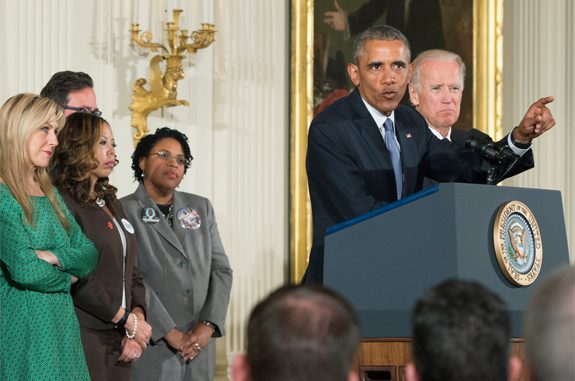

The day after President Obama announced his executive actions on control measures, an editorial headline in the San Jose Mercury News (Jan. 6) read as follows: “Obama’s executive order on guns came only after Congress failed to act”. The implication, it seemed to me, undermines the whole reason why the American Founders gave us a Constitution. The Constitution was designed precisely to prevent a President from acting on his own authority when the Congress—whose competency it was to make the laws, including gun laws—did not approve.
The Founders added the Second Amendment as a specific check on arbitrary power. They also understood the common sense recognition that guns as such do not cause the problems that the President shed his tears about. Our tears should be reserved for minds that can so easily blind themselves to their obligation to obey the Constitution, not to step in and do it alone when proper checks on power are in place. The proper name for such a proposal to go it alone, in classical thought, is “tyrannical”—the exercise of unauthorized power.
The very wording of the headline recalls Cicero and his efforts to save the Republic. The fact is that Cicero did not save the Republic. As I recall, of the many reflections on the rise of Augustus Caesar, the single most powerful one was the assumption that the newly acquired empire could not stand unless all power was concentrated in a Caesar. The newspaper headline, in other words, knowingly or not, repeated the classical argument against republican forms of rule. If an executive does not achieve what he wants, he now can go ahead and do what he proposes without the approval of normal constitutional processes. The end justifies the means.
Put in other terms, if the legislature did not approve of this or that proposal, it meant that, whatever its merits, it should not be the law or implemented extra legem. The concept of a Constitution was to prevent laws being enacted or decrees being issued that were not agreed upon by enough of the citizenry to show their reasonableness. The headline thus, with a law-abiding executive, should have read: “Obama does not act when Congress does not act.”
The proper way to proceed, when such approval is not given, is to follow the Constitutional criterion: seek to persuade and seek to elect other congressmen. But there is a reason why the Congress does not “act” in the manner that the President wants. It is because very good reasons can be found to think his views are simply wrong for the purpose intended. Most citizens understand this; Congressmen from both parties understand this. They are not mad or irrational. Nor do they seek to take over the presidency except in upcoming elections. They do not think that the citizenry is unprotected without these executive proposals. Simply put, it thinks they are less safe with them.
In Roman Law, we find the famous principle: Salus reipublicae supreme lex—the salvation of the republic is the supreme law. This is a very dicey principle, for it justifies the sacrifices citizens often have to make just to save themselves. It can also mean that somewhere in any state there exists sufficient power and authority to accomplish what is necessary.
The hard part comes when we add the Machiavellian codicil, namely, that the Prince is also free of the restrictions proffered by the distinction between good and evil. If he is not bound by either an unwritten law or a written one, a Prince need not pay any attention to constitutional or moral restraints.
If we read the headline in this light, it reveals a Prince who does not see himself bound by constitutional restrictions and this in the name of the good of the state as he sees it. Therefore, it is permitted to “act” where a legislature does not agree. As I say, headlines in newspapers can often offer material for the most fundamental legal and philosophical reflections, not to mention the prudential ones that have to do with guns and safety.
If you value the news and views Catholic World Report provides, please consider donating to support our efforts. Your contribution will help us continue to make CWR available to all readers worldwide for free, without a subscription. Thank you for your generosity!
Click here for more information on donating to CWR. Click here to sign up for our newsletter.


